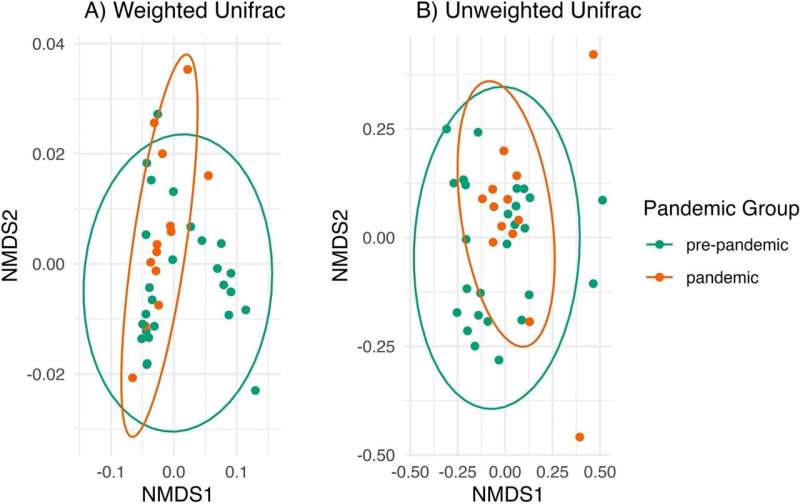This article has been reviewed according to Science X's editorial process and policies. Editors have highlighted the following attributes while ensuring the content's credibility:
fact-checked
peer-reviewed publication
trusted source
proofread
Pandemic may have changed the gut bacteria of infants, research finds

Infants who spent most of their first year in the pandemic have fewer types of bacteria in their gut than infants born earlier, according to a team of developmental psychology researchers.
The findings, published in Scientific Reports, showed that infants whose gut microbes were sampled during the pandemic had lower alpha diversity of the gut microbiome, meaning that there were fewer species of bacteria in the gut. The infants had a lower abundance of Pasteurellaceae and Haemophilus—bacteria that live within humans and can cause various infections—and significantly different beta diversity, which tells us how similar or dissimilar the gut microbiome for two groups may be.
The authors indicate in their article that the differences may have been influenced "by the social changes caused by the COVID-19 pandemic, with infants potentially experiencing more time at home, less time in daycare interacting with other children, increased hygiene in the environment, changes to diet and breastfeeding practices, and increased caregiver stress…"
"The COVID-19 pandemic provides a rare natural experiment to help us better understand how the social environment shapes the infant gut microbiome, and this study contributes to a growing field of research about how changes to an infant's social environment might be associated with changes to the gut microbiome," says Sarah C. Vogel, the article's co-lead author and recent doctoral graduate from NYU Steinhardt's Developmental Psychology program.
For their study, the authors compared stool samples of two socioeconomically and racially diverse group of 12-month-olds living in New York City that were provided before the pandemic (34 infants) and between March and December of 2020 (20 infants).
The authors say that while speculating on the health implications of gut microbiome differences should be done with caution, gut diversity has been linked to health outcomes across the lifespan.
"In adults we know that lower diversity of the microbiota species in the gut has been linked to poorer physical and mental health," says Natalie Brito, senior author and associate professor at NYU Steinhardt. "But more research is needed on the development of the gut microbiome during infancy and how the early caregiving environment can shape those connections."
More information: Francesca R. Querdasi et al, A comparison of the infant gut microbiome before versus after the start of the covid-19 pandemic, Scientific Reports (2023). DOI: 10.1038/s41598-023-40102-y



















